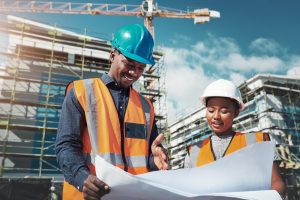Construction and Infrastructure Trends in the wake of the Covid 19 pandemic, the war in Ukraine, and the global recession – from London to Lagos
by Yolanda Walker – Partner, DWF & Ngo-Martins Okonmah – Partner, Aluko & Oyebode
Notwithstanding a global pandemic, a global downturn, and a war in Ukraine, the overwhelming need for bigger and better infrastructure worldwide means that the global construction industry cannot sleep. So how is the industry responding to the extreme turbulence caused by the events of the last three years?
On one view, it is arguable that Lagos and London alike appear to be pressing ahead with the delivery of an ambitious infrastructure programme. In Lagos, since the pandemic, major projects such as the Lekki Deep Sea Port, the Ibadan railway line, and the development of Alaro City have all been completed or near completion. Similarly in London, Crossrail, Battersea power station, and Thames Tideway have also been completed or remain on their way to completion. However, the pandemic threw a curve ball to all existing major projects, and achieving completion is a feat not to be overlooked in the circumstances.
Numerous projects have come to a complete standstill or yielded to extreme delays following the sharp escalation of project costs and liquidity issues. There has been plentiful debate and legal argument presented regarding the doctrine of force majeure and the rise in geopolitical risks have only muddied the waters. As a consequence, we are seeing more and more project disputes as parties seek to find in the law: solutions, protection and relief from the challenges of project delivery. Last year, the Lagos Chamber of Commerce International Arbitration Centre recorded that the highest number of disputes referred arose out of construction projects. In the UK, the Construction Products Association forecast productivity to fall by 3.9% this year and against a backdrop of rising prices and increases in the costs of borrowing, a rise in construction disputes is somewhat inevitable.
Any contractor with a crystal ball in 2019 would likely have fought tooth and nail for the inclusion of a reasonable price escalation clause and used provisional sums more sparingly. Equally, employers would have given even more attention to insurance, performance bonds, parent company guarantees, and vesting certificates. Albeit whilst the industry now appears to be pre-empting inflation with the increasing use of these contractual mechanisms, the ultimate pre-emptive action to maintain cost control and cash flow is simply to press pause. HS2 and the Lower Thames Crossing project are good examples of this strategy being employed. Each of these projects has been subject to deliberate pauses by the UK government as one way to manage the inflationary risk currently faced. In Lagos, Amore Multiplex, a multipurpose commercial and recreational structure in the heart of Lagos, has been put on hold due to increases in the project cost arising from inflation.
Where pausing projects is not an option, continuing to progress under high economic pressure will see parties look to other means of retaining cost control. A relevant example is the ongoing construction of the Isheagu-Ewulu road and bridge, led by the Delta State government in Nigeria. In light of the prevailing economic circumstances, the Delta State government has taken proactive measures to avoid a project pause by initiating negotiations to revise the contract price. This approach is being pursued as an alternative to engaging a replacement contract, which could potentially lead to increased costs.
Collaboration is, however, increasingly difficult in the face of narrowing margins and near impossible in the face of large potential losses. Therefore whilst parties are encouraged to properly find creative solutions to keep ahold of costs when the contractual mechanisms are falling short, there may come a time when only effective dispute management is the appropriate next step.


















